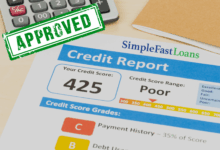Online Payday Loans: A Comprehensive Guide
Online payday loans offer a quick solution for short-term financial needs, but understanding their intricacies is crucial. This guide explores the process of obtaining these loans, the associated risks and benefits, and how to navigate the complexities of the online lending landscape responsibly. We will examine various aspects, from finding reputable lenders to exploring viable alternatives and managing potential debt.
We’ll delve into the legal considerations governing online payday loans across different regions, comparing them to traditional bank loans to provide a clear understanding of their cost-effectiveness. Furthermore, we will analyze real-world scenarios where these loans might be helpful and where they could prove detrimental to one’s financial well-being. The goal is to equip readers with the knowledge needed to make informed decisions regarding online payday loans.
What are Online Payday Loans?
Online payday loans are short-term, small-dollar loans designed to bridge the gap between paychecks. They are typically repaid on the borrower’s next payday, hence the name. These loans are primarily accessed and managed through online platforms, eliminating the need for in-person visits to a lender’s office. A key characteristic is their relatively high interest rates compared to traditional loan options.
Online payday loan applications are generally straightforward. Borrowers typically submit an application online, providing personal and financial information, including their employment details and bank account information. The application process is often quick, with approvals sometimes occurring within minutes. Once approved, the loan amount is usually deposited directly into the borrower’s bank account. Repayment is typically automatically deducted from the borrower’s account on their next payday.
Legal Framework of Online Payday Loans
The legal landscape surrounding online payday loans varies significantly across different jurisdictions. Some states or countries have strict regulations limiting interest rates, loan amounts, and the number of rollovers allowed, while others have more lenient laws or no specific regulations at all. This variation leads to significant differences in the cost and accessibility of these loans depending on the borrower’s location. For example, some jurisdictions may outright ban payday loans, while others may have strict caps on annual percentage rates (APRs). Borrowers should always research the specific laws in their area before considering an online payday loan. Failure to comply with these laws can result in severe penalties for both lenders and borrowers.
Comparison of Online Payday Loans and Traditional Bank Loans
The table below illustrates the stark differences between online payday loans and traditional bank loans, primarily focusing on interest rates, loan amounts, and repayment terms. It is crucial to understand these differences before deciding which loan type is appropriate for individual circumstances. Payday loans, while offering quick access to funds, come at a significantly higher cost.
| Loan Type | Interest Rate Range | Loan Amount | Repayment Terms |
|---|---|---|---|
| Online Payday Loan | 300% – 700% APR (Annual Percentage Rate) | $100 – $1000 | 2 weeks – 1 month |
| Traditional Bank Loan (Personal Loan) | 6% – 36% APR | $1000 – $100,000+ | Several months – Several years |
Risks and Benefits of Online Payday Loans
Online payday loans offer a quick solution for urgent financial needs, but they come with significant risks that borrowers must carefully consider. Understanding both the potential benefits and drawbacks is crucial before taking out such a loan. This section will explore the advantages and disadvantages, providing context for informed decision-making.
Financial Risks Associated with Online Payday Loans
The high-interest rates charged on payday loans are a primary concern. These rates can easily exceed 400% APR, leading to a rapid accumulation of debt. Missed payments result in additional fees and charges, potentially creating a cycle of debt that is difficult to escape. Furthermore, the short repayment period, often just two weeks, can put borrowers under immense pressure to repay the loan, even if unexpected expenses arise. Repeated reliance on payday loans can significantly damage credit scores, making it harder to obtain credit in the future for larger purchases like a car or a house. Finally, some unscrupulous lenders engage in predatory lending practices, employing deceptive tactics to trap borrowers in a cycle of debt.
Convenience and Accessibility of Online Payday Loans
Online payday loans offer significant convenience and accessibility. The application process is typically quick and simple, often requiring minimal documentation. Borrowers can apply from the comfort of their homes, eliminating the need for travel to a physical location. This accessibility is particularly beneficial for individuals with limited mobility or those living in areas with limited access to traditional lending institutions. The speed of the loan disbursement is another advantage, with funds often deposited into the borrower’s account within 24 hours, providing immediate relief in emergency situations.
Comparison of Advantages and Disadvantages
| Advantages | Disadvantages |
|---|---|
| Quick and easy application process | Extremely high interest rates |
| Fast disbursement of funds | Short repayment period |
| Convenient online application | Risk of debt trap |
| Accessibility for those with limited mobility or access to traditional lenders | Potential for damage to credit score |
Scenarios Where Online Payday Loans Might Be Beneficial or Detrimental
Online payday loans might be beneficial in situations such as unexpected car repairs, urgent medical expenses, or covering a temporary shortfall in income before receiving a paycheck. For example, a single mother facing an unexpected medical bill for her child might find a payday loan helpful in covering the immediate costs. However, using a payday loan to fund non-essential purchases or to cover recurring expenses is almost always detrimental. For instance, using a payday loan to pay for a weekend getaway or to consistently cover rent would quickly lead to unmanageable debt. A person who frequently relies on payday loans to cover everyday expenses is likely to face a serious financial crisis.
Finding Reputable Online Payday Loan Providers
Securing a payday loan online requires careful consideration to avoid predatory lenders and protect your financial well-being. Navigating the online lending landscape necessitates understanding how to identify trustworthy providers and recognizing the red flags associated with fraudulent operations. This section provides guidance on finding reputable online payday loan providers.
Choosing a reputable online payday loan provider is crucial to ensure a safe and transparent borrowing experience. A responsible lender will provide clear terms and conditions, transparent fees, and a straightforward application process. Conversely, predatory lenders often employ deceptive tactics, hidden fees, and aggressive collection methods. Understanding the key differences is paramount to making an informed decision.
Identifying Legitimate Online Payday Loan Providers
Legitimate online payday loan providers adhere to strict regulatory guidelines and prioritize consumer protection. They operate with transparency, clearly outlining all fees and interest rates upfront. They also employ secure data encryption to protect sensitive personal and financial information. Furthermore, they are typically registered with relevant financial authorities and maintain a positive reputation among consumers and industry watchdogs. Avoid lenders who are vague about their fees or who pressure you into making quick decisions.
Warning Signs of Fraudulent or Predatory Online Payday Loan Companies
Several warning signs indicate a potentially fraudulent or predatory online payday loan company. These include unusually high interest rates or fees that are not clearly explained, aggressive or high-pressure sales tactics, requests for upfront fees or payments, lack of a physical address or contact information, and overwhelmingly negative online reviews or complaints from previous borrowers. A lender who promises guaranteed approval without assessing your creditworthiness should also raise serious concerns. Be wary of lenders who demand access to your bank account without your explicit consent.
Factors to Consider When Choosing an Online Payday Loan Provider
Before applying for an online payday loan, consider several crucial factors. These include the Annual Percentage Rate (APR), which reflects the total cost of borrowing; the loan term, indicating the repayment period; the lender’s licensing and registration status; the clarity and accessibility of their terms and conditions; the availability of customer support channels; and the lender’s reputation and online reviews. Compare offers from multiple lenders to find the most suitable option. Don’t rush into a decision; take time to research and compare.
Checklist for Evaluating the Trustworthiness of Online Lenders
To assist in your decision-making process, use the following checklist to evaluate the trustworthiness of potential online lenders:
Before applying for a loan, carefully review the following:
- Verify Licensing and Registration: Check if the lender is licensed and registered with the relevant state or federal authorities.
- Examine the APR and Fees: Compare the APR and all fees charged by different lenders to find the most competitive offer.
- Review Terms and Conditions: Carefully read the loan agreement, ensuring you understand all terms and conditions before signing.
- Check Online Reviews and Complaints: Search online for reviews and complaints from previous borrowers to assess the lender’s reputation.
- Assess Customer Support: Verify the availability of multiple customer support channels, such as phone, email, and live chat.
- Confirm Data Security Measures: Ensure the lender employs robust data encryption and security protocols to protect your personal information.
- Beware of High-Pressure Tactics: Avoid lenders who employ aggressive or high-pressure sales tactics.
Alternatives to Online Payday Loans
Online payday loans, while offering quick access to cash, often come with high interest rates and fees that can trap borrowers in a cycle of debt. Fortunately, several alternatives exist that provide more manageable and affordable short-term financial solutions. Exploring these options carefully can significantly improve your financial well-being.
Short-Term Borrowing Options
Several alternatives to online payday loans offer short-term financial relief with potentially lower costs and more manageable repayment terms. These include small personal loans from banks or credit unions, borrowing from family or friends, using a credit builder loan, and leveraging existing credit cards responsibly. Each option presents a unique set of advantages and disadvantages that should be carefully considered before making a decision.
Comparison of Costs and Benefits
Compared to payday loans, alternative short-term borrowing options generally offer lower interest rates and fees. For instance, a small personal loan from a credit union might have an APR of 10-18%, significantly lower than the triple-digit APRs commonly associated with payday loans. While the application process might take longer than for a payday loan, the long-term financial benefits far outweigh the initial inconvenience. Borrowing from family or friends, while seemingly the easiest option, carries the risk of straining relationships if repayment terms are not clearly defined and adhered to. Credit builder loans, designed to improve credit scores, come with lower interest rates but require consistent on-time payments. Finally, using a credit card responsibly (only for amounts you can repay promptly) avoids high interest charges associated with payday loans but requires careful budgeting and disciplined spending habits.
Eligibility Criteria for Short-Term Loan Options
Eligibility criteria vary significantly across different short-term loan options. Payday loans often have minimal requirements, primarily focusing on proof of income and a bank account. In contrast, personal loans from banks and credit unions typically require a higher credit score, a stable income history, and a thorough credit check. Borrowing from family or friends depends entirely on the lender’s willingness and trust. Credit builder loans usually target individuals with limited or damaged credit histories, offering a pathway to building creditworthiness. Credit card usage requires existing credit approval and responsible credit management.
Accessibility and Associated Fees of Alternative Loan Options
| Loan Type | Accessibility | Fees | Repayment Terms |
|---|---|---|---|
| Small Personal Loan (Bank/Credit Union) | Moderate (Credit check required, may need good credit history) | Variable APR (typically lower than payday loans), origination fees may apply. | Variable, typically 6-60 months. |
| Borrowing from Family/Friends | High (depends on personal relationships) | Variable, often interest-free but with agreed-upon repayment terms. | Variable, agreed upon by both parties. |
| Credit Builder Loan | High (for those with limited or damaged credit) | Low APR, often with small monthly fees. | Variable, typically 12-24 months. |
| Credit Card | High (if you already have an approved card) | Variable APR (depends on credit score and card terms), late payment fees, cash advance fees. | Variable, minimum payments due monthly, full balance ideally paid monthly. |
Managing Online Payday Loan Debt
Securing an online payday loan can offer short-term financial relief, but managing the repayment responsibly is crucial to avoid spiraling debt. Failing to repay on time can lead to severe financial consequences. This section details strategies for responsible repayment, explores the ramifications of default, and outlines options for debt management and assistance.
Effective management of online payday loan debt hinges on proactive planning and responsible financial behavior. This includes carefully reviewing loan terms, budgeting meticulously to ensure timely repayment, and seeking help when needed. Ignoring the debt will only exacerbate the problem, leading to increased fees, damaged credit, and potential legal action.
Strategies for Repaying Online Payday Loans
Several strategies can help borrowers manage and repay online payday loans responsibly. A structured approach, combining budgeting and potential debt management solutions, is key to successful repayment.
- Create a Detailed Budget: Track all income and expenses to identify areas where spending can be reduced. This will free up funds for loan repayment.
- Prioritize Loan Repayment: Allocate a specific portion of your monthly income towards the payday loan repayment. Consider automating payments to ensure timely repayment.
- Negotiate with the Lender: If facing difficulty repaying, contact the lender immediately to discuss potential repayment options, such as extending the repayment period or setting up a payment plan. Many lenders are willing to work with borrowers facing hardship.
- Seek Credit Counseling: A credit counselor can provide personalized guidance on budgeting, debt management, and negotiating with creditors. They can help you create a realistic repayment plan and explore debt consolidation options.
Consequences of Defaulting on an Online Payday Loan
Defaulting on a payday loan can have significant and far-reaching negative consequences for borrowers’ financial well-being and credit history.
- Increased Fees and Interest: Late payments often result in substantial late fees and increased interest charges, quickly escalating the debt.
- Damaged Credit Score: Missed payments are reported to credit bureaus, negatively impacting your credit score, making it harder to obtain loans, credit cards, or even rent an apartment in the future.
- Debt Collection Actions: Lenders may pursue aggressive debt collection tactics, including phone calls, letters, and even legal action to recover the debt.
- Wage Garnishment: In some cases, lenders can obtain court orders for wage garnishment, where a portion of your paycheck is automatically deducted to repay the loan.
- Legal Action: Repeated defaults can lead to lawsuits and judgments against the borrower, potentially resulting in further financial penalties and legal fees.
Debt Consolidation and Financial Assistance Options
For borrowers struggling with multiple debts, including payday loans, debt consolidation or seeking financial assistance may offer viable solutions.
- Debt Consolidation Loans: These loans combine multiple debts into a single, more manageable payment, often with a lower interest rate. However, eligibility depends on creditworthiness.
- Balance Transfer Credit Cards: Some credit cards offer 0% introductory APR periods, allowing borrowers to transfer balances from high-interest debts, like payday loans, and pay them off interest-free during the promotional period. This requires good credit.
- Credit Counseling Agencies: Non-profit credit counseling agencies offer free or low-cost financial guidance and debt management programs. They can help negotiate with creditors and develop a debt repayment plan.
- Government Assistance Programs: Depending on individual circumstances and location, government assistance programs may be available to help with financial hardship, such as unemployment benefits or food stamps.
Resources for Individuals Struggling with Payday Loan Debt
Several organizations offer support and resources to individuals struggling with payday loan debt. These resources can provide valuable guidance and assistance in navigating challenging financial situations.
- National Foundation for Credit Counseling (NFCC): The NFCC is a non-profit association of credit counseling agencies that offers referrals to certified counselors.
- Consumer Financial Protection Bureau (CFPB): The CFPB is a U.S. government agency that provides resources and information on consumer financial protection, including payday loans.
- Local Non-profit Organizations: Many local non-profit organizations offer financial literacy programs and debt counseling services.
The Impact of Online Payday Loans on Consumers
Online payday loans, while offering quick access to cash, can have a significant and multifaceted impact on consumers, affecting their financial well-being and contributing to broader societal challenges. The ease of access, coupled with often-high interest rates and short repayment periods, creates a potential for a cycle of debt that can be difficult to escape. Understanding these impacts is crucial for responsible borrowing and informed financial decision-making.
The widespread use of online payday loans contributes to a complex societal impact. High-interest rates and short repayment terms disproportionately affect low-income individuals and families, exacerbating existing financial inequalities. The convenience of online access can mask the inherent risks, leading to over-reliance and potential financial hardship for vulnerable populations. This can lead to a strain on community resources and increased demand for social services designed to alleviate poverty and debt.
Financial Hardship Related to Online Payday Loans
The potential for financial hardship stemming from online payday loans is substantial. The high-interest rates, often exceeding 400% APR, can quickly lead to a debt trap. Missed payments result in further fees and charges, escalating the debt burden exponentially. This can lead to a cascade of negative consequences, including difficulty paying essential bills, impacting credit scores, and even leading to legal action from lenders. For example, a $500 payday loan with a 400% APR could easily balloon into a debt far exceeding the initial amount within a short timeframe, even with regular payments. Many borrowers find themselves trapped in a cycle of repeatedly taking out new loans to cover existing debts, making it increasingly challenging to break free.
Responsible Borrowing Practices to Mitigate Risks
Responsible borrowing practices are vital to mitigating the risks associated with online payday loans. Before considering a payday loan, borrowers should carefully assess their financial situation, exploring all available alternatives first. This includes creating a realistic budget, identifying areas where spending can be reduced, and considering options like credit counseling or negotiating with creditors. Borrowers should also thoroughly compare interest rates and fees from different lenders to find the most favorable terms possible, and only borrow the absolute minimum amount needed. Finally, it is crucial to have a clear repayment plan in place before accepting the loan to ensure timely repayment and avoid the accumulation of additional fees and charges.
The Cycle of Payday Loan Debt
Imagine a visual representation: A circular diagram shows a person starting with a need for quick cash. They take out an online payday loan. The short repayment period and high interest quickly create a larger debt. The individual struggles to repay, leading to missed payments and increased fees. To cover the larger debt and fees, they take out another payday loan, entering a vicious cycle. The circle continues, showing the snowball effect of accumulating debt, with the initial loan amount growing exponentially larger over time. This visual effectively illustrates the difficulty of escaping the trap of repeated borrowing and the devastating financial consequences.
Closure
Navigating the world of online payday loans requires careful consideration and a clear understanding of the associated risks and benefits. While these loans can provide immediate financial relief, responsible borrowing practices and awareness of potential pitfalls are paramount. By exploring alternative options and prioritizing financial literacy, individuals can make informed choices that align with their long-term financial health and avoid the potential cycle of debt. Remember, responsible financial management is key to achieving financial stability.





